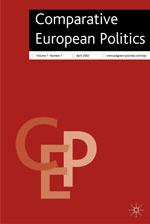Governance and Societies
States remain essential pillars of the international system, even if they are not the only players. Governance is a local, national and international issue.
Related Subjects


National models of integration and the crisis of multiculturalism: a critical comparative perspective

The Problems with National Models of Integration: A Franco Dutch Comparison
Undocumented Workers in Spain and the Politics of Regularization
By the end of 2004, low migration flow regulation contributed to a high rate of irregularity and hampered adaptation of foreign labor supplies to the demands of the Spanish labor market, contributing therewith to an increase in irregular workers. The remarkable change came with the change of government in March 2004 and with the approval of the Royal Decree 2393/2004 which established a complex system for managing immigration and was accompanied by the sixth and final regularization process, driven by government, business, and employer organizations in the framework of the Social Dialogue.
Greece: How a State in Crisis Manages Its Migration Crisis
In the past 2 years, Greece has experienced its most severe economic crisis of the post-World War II period. While it appeared at first not to have been hit particularly hard by the global economic recession that started in 2008, the effects of the recession and the acute internal crisis of public finances became visible in late 2009.
Migration Policy and Irregular Workers in the United Kingdom
While public opinion and European governments usually present migrants as an outside threat for European societies, in this article, Danièle Joly and Khursheed Wadia focus on the local level to analyze the issue of migrants, in particular irregular workers, living in the UK.
Linking Business and Migration Policy in the USA
On Friday, the 13th of January, 2012, the Center for Migrations and Citizenship welcomed Jesus 'Chuy' Garcia - Cook County Commissioner, Chicago (USA) - as a speaker of its international conference "Business and the State: Migration Policies, Diversity and Integration".
Racial integration - Lessons from the U.S. Army
On Friday, the 13th of January, 2012, the Center for Migrations and Citizenship welcomed 3-star U.S. Army General Bostick as a speaker of its international conference: "Business and the State: Migration Policies, Diversity and Integration".

Immigration, Incorporation, and Diversity in Western Europe and the United States: Comparative Perspectives
Migrations and Revolutions: Reflections on the Recent Events in North Africa from an International Relations Perspective
The promise of democracy enshrined in the "Arab Spring" has been accompanied by significant developments in migration flows across North Africa and to Europe. With political turmoil sweeping across North Africa and the Middle East, hundreds of thousands of persons, mainly from Libya, have been displaced since January 2011.

European Task Force on Irregular Migrations - Country Report: Italy
In order to understand the present configuration of immigration policies in Italy, it is necessary to follow a path of double logic at every step of the analysis. On one side, the study will identify consistent trends in the country’s “immigration history” that continue to shape the main features of the reality of immigration today (see §§ 2.1 and 2.2). On the other side, the study will focus on major changes in the regulation of immigration and the policies addressing undocumented migrants that occurred in more recent times (see § 2.3.).
Support independent French research
Ifri, a foundation recognized as being of public utility, relies largely on private donors – companies and individuals – to guarantee its sustainability and intellectual independence. Through their funding, donors help maintain the Institute's position among the world's leading think tanks. By benefiting from an internationally recognized network and expertise, donors refine their understanding of geopolitical risk and its consequences on global politics and the economy. In 2025, Ifri supports more than 80 French and foreign companies and organizations.







